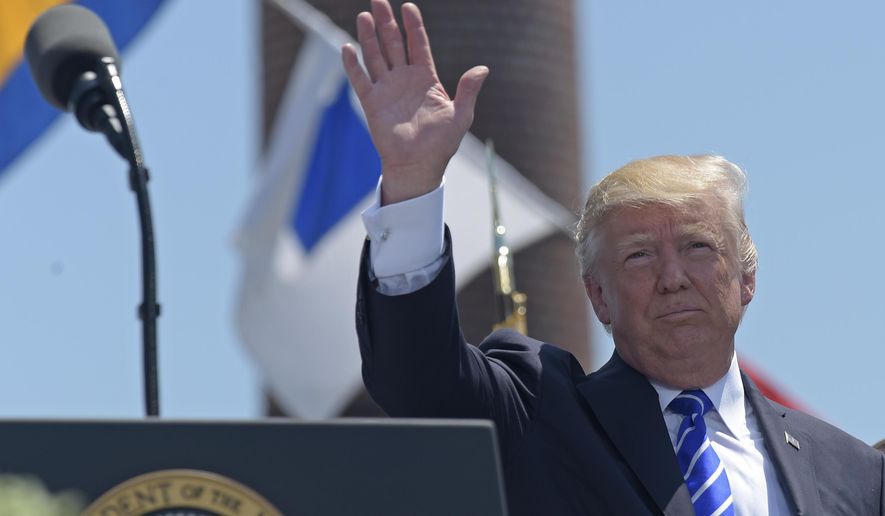President Trump and his Cabinet are speaking rarely at this year’s college graduations, even as the annually lopsided measure of liberal versus conservative commencement speakers seems more balanced than usual.
When they do speak, they are opposed by students such as those who walked out Saturday at Taylor University, a Christian liberal arts school in Indiana, unable to abide Vice President Mike Pence as a speaker at their graduation ceremony.
For most of the past 50 years, presidential speeches at graduations have been a staple of America’s spring landscape. President Barack Obama, for example, gave 24 graduation speeches during his eight-year presidency on campuses large and small.
Mr. Trump hasn’t been invisible among the caps and gowns, but bigger public stages, such as those at Ohio State and Rutgers universities, have been closed to Mr. Trump. Both schools invited Mr. Obama.
“The campus has become seriously radicalized in the last few years, and the eggshell-thin temperament of some students won’t tolerate this president, even though most schools would usually be delighted to get the sitting president to address them,” said Peter Wood, president of the National Association of Scholars, a conservative group.
The president is scheduled to address Air Force Academy graduates, one year after he spoke to the class of 2018 at the Naval Academy in Annapolis, Maryland.
He also will speak at Liberty University in Virginia, a conservative school that also has invited Mr. Pence to deliver a commencement address.
But it’s one of the leaders of the European Union — German Chancellor Angela Merkel — instead of the leader of the free world who will speak at Harvard University.
The White House did not comment on the topic.
That conservatives are not massively outnumbered at graduation ceremonies this year is less a reflection of intellectual balance on campus than a lack of courage, some graduation watchers say.
Some say the change is part of a larger movement as universities, burned by bad publicity, try to avoid controversy.
“It’s true there isn’t as bad an imbalance this year but — and it’s a big ’but’ — the reason is because schools, in general, are shying away from political speeches,” said Nicole Neily, president of Speech First, a nonprofit whose goal is to preserve free speech on campuses.
“They’re as cowed by the mob as they are by their students, and so they’ve turned cowardly,” Ms. Neily said. “They’re inviting celebrities, sports stars, musicians and that sort of thing instead.”
Actresses Katie Holmes and Jennifer Garner will speak at the University of Toledo and Denison University, respectively, and actor Pierce Brosnan will speak at Dickinson College. NFL lineman J.J. Watt will address graduating seniors at the University of Wisconsin, and actor John Krasinski will deliver the ceremonial speech at Brown. Both are returning to their alma maters.
Nevertheless, commencement ceremonies are clearly different under the Trump administration.
From 2013 to 2017, when Mr. Trump took office, Democrats dominated commencement lineups.
College graduates have heard departing wisdom from elected Democrats such as former Vice President Joseph R. Biden, Sen. Tammy Baldwin, Sen. Cory A. Booker and Sen. Kirsten Gillibrand. They also have heard from Democratic political operatives such as James Carville, George Stephanopolous and Jon Favreau, as well as liberal journalists Jill Abramson, former New York Times executive editor, and Washington Post Editor Martin Baron.
Conservatives were few and usually hewed close to center. Gen. Colin L. Powell, former secretary of state, was a popular choice, and actor and former California Gov. Arnold Schwarzenegger also spoke. But even Condoleezza Rice, the first female national security adviser and a former secretary of state, was politically unacceptable to Rutgers students.
Left-wing celebrity speakers included television host Stephen Colbert, actor Alan Alda and popular scientist Bill Nye.
This year, two big female stars are on the list: Oprah Winfrey, who will speak at Colorado College, and Anita Hill, who will speak to the women of Wellesley College.
One of the few staunch conservatives who will take the stage is former Indiana Gov. Mitch Daniels, who will speak at Purdue University — where he is president.
Still, the paucity of the president’s appearances is striking. President George H.W. Bush gave 23 commencement speeches during his four years in office. Since then, the chief executive has given an average of three addresses a year.
With the exception of a gap during the Nixon administration and two single years since, the president has never failed to make a graduation speech somewhere, a streak Mr. Trump has kept alive thanks to the military service academies.
Throughout that time, however, conservatives were barely represented. Shortly after Mr. Obama was reelected, the striking disparity was noted by the statistics wizards at the FiveThirtyEight website.
“Conservatives have complained that they’ve been singled out, leaving only non-politicians and Democrats to offer a final word to newly minted college graduates,” FiveThirtyEight wrote in 2014. “Based on commencement address data from the last two years, they’re right.”
Rattling off the list of this year’s commencement speakers — Ms. Gillibrand and Mr. Booker, who are running for president, Supreme Court Justice Sonia Sotomayor and Mr. Nye — Mr. Wood said, “The liberal left is well represented, and no one will say anything about them.”
The risk that agitators could spoil graduation for students and parents is one college presidents and trustees seem unwilling to take.
“So the heckler’s veto is operating here in a pre-emptive way when it comes to Mr. Trump and members of his administration,” Mr. Wood said.
• James Varney can be reached at jvarney@washingtontimes.com.




Please read our comment policy before commenting.